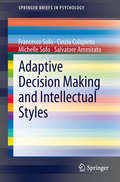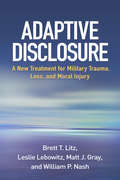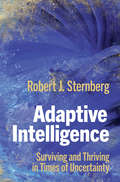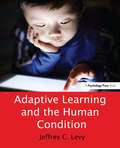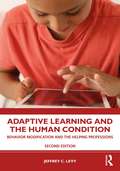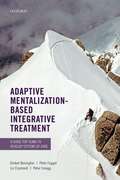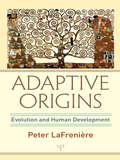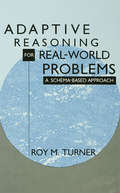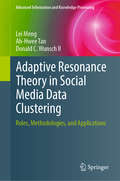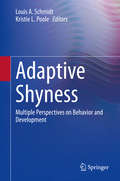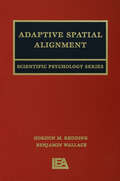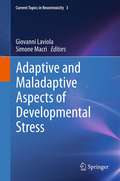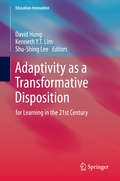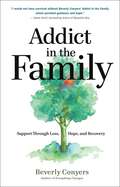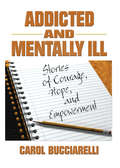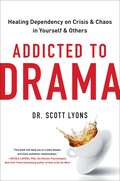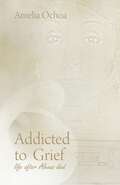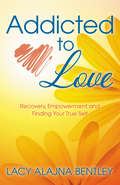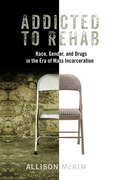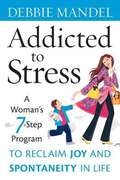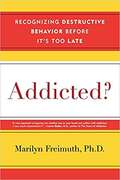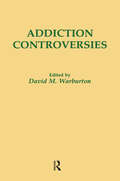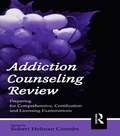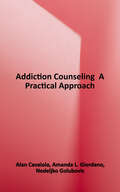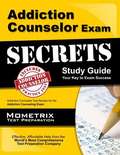- Table View
- List View
Adaptive Decision Making and Intellectual Styles (SpringerBriefs in Psychology #13)
by Salvatore Ammirato Francesco Sofo Cinzia Colapinto Michelle SofoThis exciting publication provides the reader with a theoretical and practical approach to adaptive decision making, based on an appreciation of cognitive styles, in a cross-cultural context. The aim of this Brief is to describe the role of thinking-through different options as part of the decision-making process. Since cognitive style influences decision behavior, the book will first examine thinking styles, which involve both cognitive and emotive elements, as habits or preferences that shape and empower one's cognition and emotion. The information contained in this Brief will be a useful resource to both researchers studying decision making as well as to instructors in the higher education sector and to human resource development practitioners, especially those working in international, multi-cultural companies.
Adaptive Disclosure: A New Treatment for Military Trauma, Loss, and Moral Injury
by Brett T. Litz Leslie Lebowitz Matt J. Gray William P. NashA complete guide to an innovative, research-based brief treatment specifically developed for service members and veterans, this book combines clinical wisdom and in-depth knowledge of military culture. <P><P>Adaptive disclosure is designed to help those struggling in the aftermath of traumatic war-zone experiences, including life threat, traumatic loss, and moral injury, the violation of closely held beliefs or codes. Detailed guidelines are provided for assessing clients and delivering individualized interventions that integrate emotion-focused experiential strategies with elements of cognitive-behavioral therapy (CBT). Reproducible handouts can be downloaded and printed in a convenient 8 1/2" x 11" size.
Adaptive Intelligence: Surviving and Thriving in Times of Uncertainty
by Robert J. SternbergAdaptive Intelligence is a dramatic reappraisal and reframing of the concept of human intelligence. In a sweeping analysis, Robert J. Sternberg argues that we are using a fatally-flawed, outdated conception of intelligence; one which may promote technological advancement, but which has also accelerated climate change, pollution, the use of weaponry, and inequality. Instead of focusing on the narrow academic skills measured by standardized tests, societies should teach and assess adaptive intelligence, defined as the use of collective talent in service of the common good. This book describes why the outdated notion of intelligence persists, what adaptive intelligence is, and how it could lead humankind on a more positive path.
Adaptive Learning and the Human Condition
by Jeffrey C. LevyAdaptive Learning and the Human Condition presents the basic principles of classical (Pavlovian) and instrumental (Skinnerian) conditioning in a more coherent and expansive manner than is the case in other textbooks. Learning is defined as an adaptive process through which individuals acquire the ability to predict, and where possible, control the environment. This overarching definition enables integration of traditional Pavlovian and Skinnerian principles and terminology and makes explicit why treatment of the learning process is essentially limited to these two historical research paradigms. Pavlov developed a methodology for studying animals under circumstances where they could predict, but not control, sequences of environmental events. Skinner studied animals under circumstances where their behavior had an effect upon environmental events. Observational learning and symbolic communication (i.e., spoken or written language) are incorporated as indirect learning processes through which individuals can acquire the ability to predict or control. This treatment creates a perspective within which it is possible to consider the fundamental nature of the learning process in understanding the human condition and in addressing significant individual and social concerns. Examples of applications and issues not included in similar textbooks include: The role of classical and instrumental conditioning in language acquisition The administration of rewards and punishers in Baumrind’s parental styles as related to Kohlberg’s stages of moral development Stone-Age hunter-gatherer and technologically-advanced cultures: How did we get from there to here? Self-control and self-actualization While covering traditional technical and theoretical issues, the book is written in a clear, engaging style. The narrative builds across chapters, culminating in the treatment of applications and societal concerns of import and interest to students and faculty alike. Upon completing this book, readers should be able to: explain the significance of human condition through adaptive learning; present the basic principles of classical and instrumental conditioning; and understand the significance of scientific research
Adaptive Learning and the Human Condition: Behavior Modification and the Helping Professions
by Jeffrey C. LevyAdaptive Learning and the Human Condition provides a coherent and comprehensive introduction to the basic principles of classical (Pavlovian) and instrumental (Skinnerian) conditioning. When combined with observational learning and language, they are responsible for human accomplishment from the Stone Age to the digital age. This edition has been thoroughly updated throughout, relating adaptive learning principles to clinical applications as well as non-traditional topics such as parenting, moral development, and the helping professions. Defining learning as an adaptive process enables students to understand the need to review the basic animal research literature in classical and operant conditioning and consider how it applies to human beings in our everyday lives. Divided into four parts, this book covers historical research into psychology and adaptive learning, principles of adaptive learning (prediction and control), adaptive learning and the human condition, and behavior modification and the helping professions. The book showcases how an adaptive learning strategy can be practical, diagnostic, and prescriptive, making this an essential companion for psychology students and those enrolled in programs in professional schools and helping professions including psychiatry, special education, health psychology, and physical therapy.
Adaptive Mentalization-Based Integrative Treatment: A Guide for Teams to Develop Systems of Care
by Peter Fuggle Dickon Bevington Liz Cracknell Peter Fonagy"Socially excluded youth with mental health problems and co-occurring difficulties (e.g. conduct disorder, family breakdown, homelessness, substance use, exploitation, educational failure) attract the involvement of multiple agencies. Poorly coordinated interventions often multiply in the face of such problems, so that a young person or family is approached by multiple workers from different agencies working towards different goals and using different treatment models; these are often overwhelming and may actually be experienced as aversive by the young person or their family. Failure to provide effective help is costly throughout life. <p><p> This is the first book to describe Adaptive Mentalization-Based Integrative Treatment (AMBIT). This is an approach to working with people - particularly young people and young adults - whose lives are often chaotic and risky, and whose problems are not limited to one domain. In addition to mental health problems, they may have problems with care arrangements, education or employment, exploitation, substance misuse, offending behaviours, and gang affiliations; if these problems are all occurring simultaneously, any progress in one area is easily undermined by harms still occurring in another. <p> AMBIT has been designed by and for community teams from Mental Health, Social Care, Youth work, or that may be purposefully multi-disciplinary/multi-agency. It emphasises the need to strengthen integration in the complex networks that tend to gather around such clients, minimising the likelihood of an experience of care that is aversive. AMBIT uses well evidenced 'Mentalization-based' approaches, that are at their core integrative - drawing on recent advances in neuroscience, psycho-analytic, social cognitive, and systemic "treatment models".
Adaptive Origins: Evolution and Human Development
by Peter LaFrenièreIn this text, students are invited to rethink psychology by grounding it in the natural sciences with the understanding that evolutionary and developmental processes work together with culture to solve problems of human adaptation. These processes are cast as interdependent: Development cannot be understood except in the light of evolutionary theory, and the best proof of evolution is the fact of development. For students of evolutionary psychology, all the central topics -- such as evolved mental modules for theory of mind or language -- require an understanding of the developmental processes that lead to their expression. Genes, as important as they are, are never the whole story. The role of biological factors is explored in chapters outlining evolution, development, genetics, human origins, hormones and the brain. Then, the integrative value of this evolutionary/developmental vision in understanding key topics in psychology is illustrated by applying it to traditional area of inquiry including infancy and attachment, emotions and their expression, social relations with peers, cognitive and language development, sex differences, courtship and mating, violence and aggression, and cooperation and competition.
Adaptive Reasoning for Real-world Problems: A Schema-based Approach
by Roy TurnerThis book describes a method for building real-world problem solving systems such as medical diagnostic procedures and intelligent controllers for autonomous underwater vehicles (AUVs) and other robots. The approach taken is different from other work reported in the artificial intelligence literature in several respects: * It defines schema-based reasoning, in which schemas -- explicitly declared packets of related knowledge -- are used to control not only the reasoner's planning, but also all other facets of its behavior. * It is a kind of reactive reasoning that the author calls adaptive problem solving -- the reasoner maintains commitments to future goals but is able to change its focus of attention as the problem-solving situation requires. * It is a context-sensitive reasoning method. Every decision it makes relies on the use of contextual knowledge to be appropriate for the current problem-solving situation. Furthermore, context is represented explicitly; by always keeping a current representation of the context in mind, the reasoner's behavior is automatically sensitive to the context with very little work needed per decision. * Schema-based reasoning -- a generalization of case-based reasoning -- extends the usual idea of case-based reasoning to encompass all aspects of the reasoner's behavior, and it extends it to make use of generalized "cases" (i.e., schemas) rather than particular cases, thus saving effort needed to transfer knowledge from an old case to a new situation. Though the work originated in the domain of medical diagnostic problem solving, treating diagnosis as a planning task, it is even more appropriate for controlling autonomous systems. The author is currently extending the approach by creating a robust controller for long-range autonomous underwater vehicles that will be used to carry out ocean science missions.
Adaptive Resonance Theory in Social Media Data Clustering: Roles, Methodologies, and Applications (Advanced Information and Knowledge Processing)
by Lei Meng Ah-Hwee Tan Donald C. Wunsch IISocial media data contains our communication and online sharing, mirroring our daily life. This book looks at how we can use and what we can discover from such big data:Basic knowledge (data & challenges) on social media analyticsClustering as a fundamental technique for unsupervised knowledge discovery and data miningA class of neural inspired algorithms, based on adaptive resonance theory (ART), tackling challenges in big social media data clustering Step-by-step practices of developing unsupervised machine learning algorithms for real-world applications in social media domainAdaptive Resonance Theory in Social Media Data Clustering stands on the fundamental breakthrough in cognitive and neural theory, i.e. adaptive resonance theory, which simulates how a brain processes information to perform memory, learning, recognition, and prediction.It presents initiatives on the mathematical demonstration of ART’s learning mechanisms in clustering, and illustrates how to extend the base ART model to handle the complexity and characteristics of social media data and perform associative analytical tasks.Both cutting-edge research and real-world practices on machine learning and social media analytics are included in the book and if you wish to learn the answers to the following questions, this book is for you:How to process big streams of multimedia data?How to analyze social networks with heterogeneous data?How to understand a user’s interests by learning from online posts and behaviors?How to create a personalized search engine by automatically indexing and searching multimodal information resources? .
Adaptive Shyness: Multiple Perspectives on Behavior and Development
by Louis A. Schmidt Kristie L. PooleThis book examines the adaptive aspects of shyness. It addresses shyness as a ubiquitous phenomenon that reflects a preoccupation of the self in response to social interaction, resulting in social inhibition, social anxiety, and social withdrawal. The volume reviews the ways in which shyness has traditionally been conceptualized and describes the movement away from considering it as a disorder in need of treatment. In addition, it examines the often overlooked history and current evidence across evolution, animal species, and human culture, demonstrating the adaptive aspects of shyness from six perspectives: developmental, biological, social, cultural, comparative, and evolutionary. Topics featured in this book include:The study of behavioral inhibition and shyness across four academic generations.The development of adaptive subtypes of shyness.Shy children’s adaptation to academic challenges.Adaptiveness of introverts in the workplace.The role of cultural norms and values in shaping shyness.Perspectives of shyness as adaptive from Indigenous Peoples of North America.The role that personality differences play on ecology and evolution. Adaptive Shyness is a must-have resource for researchers and professors, clinicians and related professionals as well as graduate students in developmental psychology, pediatrics, and social work as well as related disciplines, including social/personality, evolutionary, biological, and clinical child psychology, anthropology, sociology, and cultural studies.
Adaptive Spatial Alignment (Scientific Psychology Series)
by Benjamin Wallace Gordon M. ReddingFor most people, prism adaptation is an amusing demonstration, first experienced perhaps in an introductory psychology course. This monograph relates this peculiar phenomenon to the larger context of cognitive science, especially motor control and learning. The first part sketches the background concepts necessary to understand the contribution of prism adaptation to the larger issue of adaptive perceptual-motor performance including: * a review of the basic concepts of motor control and learning that enable strategic response in the prism adaptation situation; * the development of a hypothesis about spatial representation and spatial mapping and an introduction to the basic idea of adaptive spatial alignment; and * a contrasting view of perceptual and motor learning and a review of evidence for the involvement of nonassociative and associative learning in prism adaptation. Directly concerned with data and theory in prism adaptation, the second part presents: * an outline of prism adaptation methodology and a list of several empirical conclusions from previous research that constrained development of theoretical framework; * a theory of strategic perceptual-motor control and learning which enables adaptive performance during prism exposure, but does not directly involve adaptive spatial alignment; * an extention of the theory to include realignment processes which correct for the spatial misalignment among sensorimotor systems produced by prisms; and * a demonstration of how traditional issues in prism adaptation may be rephrased in terms of the present theoretical framework. The last part of this volume reviews the research conducted in developing and testing the present theory of prism adaptation. It summarizes the initial investigations (employing a naturalistic exposure setting), reports some more rigorous tests with an experimentally constrained research paradigm, points out the more general theoretical issues raised by the authors' analysis of prism adaptation, and makes specific suggestions for further research within the prism adaptation paradigm.
Adaptive and Maladaptive Aspects of Developmental Stress (Current Topics in Neurotoxicity #3)
by Giovanni Laviola Simone MacrìSince the very early stages of life, we all experience some form of stress. Stressors can be mild to severe and can range from unsuccessfully longing for maternal milk in infancy, to recklessly wiggling on a motorbike to be on time to watch the NBA finals on TV, to breaking up a relationship. All those events that we call "stress" have the capability of perturbing a given state of psychological and physiological equilibrium and moving it to a different level. The transition from crawling to walking has to be considered a form of stress as much as losing a job. It is through a continuous cross-talk between environmental stressors and individual adaptations that we build our personalities and our ways to cope with daily hassles. External challenges should not necessarily be regarded as "bad", but instead seen as constructive forces forming our ability to navigate a changing world. What is stress good for? What is stress bad for? When and why do we need to be "stressed"? Should we worry about stress? When does stress equate to "normality"? When does it turn into pathology? We hope with this book to provide some answers to these fundamental questions.
Adaptivity as a Transformative Disposition: for Learning in the 21st Century (Education Innovation Series)
by Kenneth Y. T. Lim David Hung Shu-Shing LeeThis volume introduces the concept of 'adaptivity' as occurring when, say, individuals cross boundaries. Through illustrations from both formal and informal learning, the book seeks to provide learning designs and frameworks for adaptivity. This book is unique as it ties together: a) social-individual dialectics; and b) adaptive learning as it relates to creativity and imagination It highlights case studies from social / new media contexts, school learning milieux, and formal and informal situations It approaches adaptive learning from the perspectives of students, teachers, school leaders, and participants in social media and other digitally mediated environments. The book is a valuable resource for practitioners and academics who are interested in adaptivity as a learning disposition.
Addict in the Family: Support Through Loss, Hope, and Recovery
by Beverly ConyersThe family recovery classic, Addict in the Family, has been revised and updated to offer parents and other family members even greater support when faced with the reality of a loved one&’s addiction. Solid, actionable advice and information about what helps and what doesn&’t—and how to care for themselves—make this an indispensable guide.For families of addicts, fear, shame, and confusion over a loved one&’s addiction can cause deep anxiety, sleepless nights, and even physical illness. The emotional distress family members suffer is often compounded by the belief that they somehow caused or contributed to their loved one&’s addiction—or that they could have done something to prevent it. Addict in the Family is a book about the pain of addiction, but more importantly it is a book of comfort, understanding, and hope for anyone struggling with a loved one&’s addiction. As the compelling personal stories reveal, family members do not cause their loved one&’s addiction—nor can they control or cure it. What family members can do is find support, set boundaries, detach with love, and eventually discover how to enjoy life more fully. This book helps them do just that—whether the loved one achieves recovery or not.
Addicted and Mentally Ill: Stories of Courage, Hope, and Empowerment
by Bruce Carruth Carol BucciarelliReconnect with dually diagnosed individuals using stories they can identify with! Addicted and Mentally Ill: Stories of Courage, Hope, and Empowerment is a powerful tool to recommend to your clients who are dually diagnosed. This book presents vignettes about people with mental illness and addiction whose situations are representative of what goes on in a dual-diagnosis in-patient setting. This nonclinical, easy-to-read resource will give you, your patients, and their family members unique insight on dual diagnosis and how co-occurring mental illness and addiction can be treated with the minimum amount of blame, shame, or poor decision-making. Addicted and Mentally Ill focuses on the most significant issues surrounding these individuals, such as: dual diagnosis and the family system-how family can help or hinder treatment the reasons why dually diagnosed clients resist treatment the fear of losing self-identity in treatment the misunderstandings about dual diagnosis-from the perspectives of the client, family members, and professionals in medicine and social work the role of hope, empowerment, and spirituality in recovery in dual diagnosis what the patient/client and family members can do to improve treatment options Addicted and Mentally Ill is unique for its storytelling format, consisting of brief tales and short explanations you can recommend to clients and families with limited clinical knowledge or time. This innovative tool answers many of the questions that dually diagnosed individuals may have and helps them learn of the issues surrounding their illness as well as their addiction. For those professionals who provide direct counseling to these clients or patients, this book offers an interesting and nonthreatening way to help them learn about treatment options. The stories in Addicted and Mentally Ill confront the life problems specific to dually diagnosed individuals, including: alcohol, drugs, and self-medication the difficulties of building trust in group therapy settings psychotropic medications illnesses such as bipolar disorder, schizophrenia, depression, and personality disorders suicide
Addicted to Drama: Healing Dependency on Crisis and Chaos in Yourself and Others
by Dr. Scott LyonsWith empathy, humor, and unique insight, a psychologist examines drama addiction and charts a path for healing in this groundbreaking book.Do you know someone who seems to thrive on chaos, a person who manufactures crisis where there is none, makes mountains out of molehills, and whose very presence feels like an inescapable whirlwind?You may even label them a &“drama queen.&” This person might be someone close to you. This person might even be you. In this groundbreaking book, clinical psychologist and mind-body expert Dr. Scott Lyons turns the notion of the &“drama queen&” on its head, showing that drama is actually an addiction and those who are suffering with it are experiencing a much deeper psychological, biological, and social pain. For a person addicted to drama, the intensity becomes their way of coping. Their life is a constant cycle of crisis, chaos, and chronically high levels of stress. They may never be able to relax without an internal alarm going off, sending them spiraling back toward chaos. Drama is the stirring, the excitement, the exaggeration, the eruption, the unrest, and the medicine to feel alive in relation to the numbing of the internal and external world around them. For a person addicted to drama, the drama is often how they survive—or think they do. With studies, primary research, and patient stories, Dr. Lyons deconstructs this little-understood addiction, sharing: what drama addiction is and what it is not how to identify patterns of drama addiction in yourself and others the somatic effects of drama addiction, including chronic fatigue, autoimmune disease, joint and muscle pains, and other conditions the origins of drama addiction— and how we are heading towards a global pandemic of a dependency on crisis and chaos accessible exercises for recovery and healing Rather than dismiss addiction to drama as just attention-seeking, Dr. Lyons offers clear-eyed empathy, humor, and practical strategies to help us all understand and break free of the drama cycle.
Addicted to Grief: Life After Alexus Died
by Amelia OchoaIn writing about grief, I hope my story can help parents and loved ones who are struggling with the death of a child. No matter the age, the death of a child seems unnatural. Untimely. It hurts, but you are not alone; the world is full of us. I am here to
Addicted to Love: Recovery, Empowerment and Finding Your True Self
by Lacy Alajna BentleyAddicted to Love is a roadmap to recovery and healthy relationships for female sex and love addicts. It’s hard to imagine love without the pain. Women who live with love addiction are a unique breed having learned to cope in a sex-driven world by finding their worth in sexuality and being wanted. The human need for lasting, meaningful relationships is constantly sabotaged by these women’s own behaviors on top of events outside their control. In Addicted to Love, Lacy A. Bentley—a woman who has been there—introduces her own recovery journey with courageous honesty to guide other women on their paths to recovery. Each chapter focuses on a different trait of emotional health and teaches women to integrate that trait in a workbook-style format. Lacy shows them how to secure their romantic heart, love like they were meant to, and break free from compulsive patterns, while presenting new ways of seeing day-to-day patterns. Every word guides brave women into the relationships they truly want and deserve—without excuses, compulsions, or addiction in the recovery roadmap of the future.
Addicted to Rehab: Race, Gender, and Drugs in the Era of Mass Incarceration
by Allison MckimAfter decades of the American “war on drugs” and relentless prison expansion, political officials are finally challenging mass incarceration. Many point to an apparently promising solution to reduce the prison population: addiction treatment. In Addicted to Rehab, Bard College sociologist Allison McKim gives an in-depth and innovative ethnographic account of two such rehab programs for women, one located in the criminal justice system and one located in the private healthcare system—two very different ways of defining and treating addiction. McKim’s book shows how addiction rehab reflects the race, class, and gender politics of the punitive turn. As a result, addiction has become a racialized category that has reorganized the link between punishment and welfare provision. While reformers hope that treatment will offer an alternative to punishment and help women, McKim argues that the framework of addiction further stigmatizes criminalized women and undermines our capacity to challenge gendered subordination. Her study ultimately reveals a two-tiered system, bifurcated by race and class.
Addicted to Stress
by Debbie MandelA woman's down-to-earth guide for releasing stress and reclaiming her free-spiritStress management expert and radio personality Debbie Mandel presents her highly original program for stress reduction. She explains that women who are constantly stressed out have forgotten the dreams of the free-spirited girl living inside them before they became somebody's wife, mother, or workplace colleague. This book, the inspiring and humorous story of successful recovery from stress addiction, outlines her seven steps that have proven to help women overcome daily stressors and reclaim a life of joy and spontaneity. Explores the habit forming pressure principle of stress addiction and how to cure it Provides step-by-step program for self-empowerment, self-care, healthy narcissism, and renewing humor in a woman's relationshipsExplains the powerful, researched based relationship between food, exercise, and moodContains indispensable strategies for accepting constructive conflicts with a spouse, partner, friend or colleague to get what she wantsTeaches specific techniques for reducing and eliminating stress reductionAddicted to Stress shows how as the addiction to stress is cured, women find it possible to build up an immunity to outside pressure and become their true core self.
Addicted?: Recognizing Destructive Behaviors Before It's Too Late
by Marilyn FreimuthDespite our associating addictions with crazy, out of control behavior, most addictions go unrecognized. Those who suffer from addictions often misinterpret their symptoms as a sign of some other problem. Health care professionals who are entrusted by society to identify such problems routinely fail to do so. When addictions are recognized, they are confined to substance use, which overlooks the wide array of activities that engage people in an addictive manner. Further, when addictions are detected, they are in their most advanced and difficult to treat phases. In large part this is due to the all or none way we think about addiction; either you are addicted or not. In reality, an addiction does not emerge fully formed; what starts out as just having fun, gradually, over time, becomes a problem. To limit the devastation created by late stage addictions and reap the benefits of early detection, this book provides questionnaires that screen for a wide array of chemical and behavioral addictions at all stages of development. Much in the same way we learned the early warning signs of cancer, this book explores different ways to recognize the early and often subtle signs of addiction. Unlike cancer, where people rush to get treatment, facing an addiction is associated with guilt and ambivalence. To navigate these feelings and get help, the book provides a step-by-step guide for how to prepare the addicted person, be it oneself or someone else, to change an addiction.
Addiction Controversies
by David M. WarburtonIn the past, the prototypes for characterizing drug use were heroin and cocaine, so that research has focused on possible commonalities between any substance and these drugs. Addiction controversies explores the problems of the commonalities approach by looking at dissimilarities as well. The first chapters of Addiction Controversies trace the development of modern medical attitudes to drug use and the current controversy over its decriminalization. The second set of chapters examines the extent to which drugs have common biological and sociological mechanisms of action and contrasts these explanations. The final chapters consider the extent to which the desires for different substances are the same and the biological and social explanations of relapse. Clinicians, researchers and students in all areas of substance use will be stimulated by these challenges to current thinking and will enjoy the comparative approach that is taken by the contributors to Addiction Controversies.
Addiction Counseling Review: Preparing for Comprehensive, Certification, and Licensing Examinations
by Robert Holman CoombsAddiction Counseling Review: Preparing for Comprehensive, Certification, and Licensing Examinations offers a clear, readable overview of the knowledge and skills those training as alcohol or other drug counselors need to pass their final degree program, certification, and licensing examinations. It is organized into six sections: Addiction Basics, Personality Development and Drugs, Common Client Problems, Counseling Theories and Skills, Treatment Resources, and Career Issues. Each chapter includes challenging study questions that enable readers to assess their own level of understanding, including true/false, multiple choice, and provocative discussion questions. Each chapter also provides a glossary of key terms and, in addition to references, annotated suggestions for further reading and Web site exploration.This book will be a resource to which students and trainees will go on referring to long after it has helped them through their examinations. In addition, faculty and established professionals will find it a useful one-stop summary of current thinking about best practice.
Addiction Counseling: A Practical Approach
by Alan Cavaiola Amanda L. Giordano Nedeljko GolubovicEquips the upcoming generation of counselors with crucial knowledge to skillfully treat both chemical and behavioral addictions <p><p>Grounded in leading-edge, evidence-based research, this hands-on text applies a step-by-step approach to addictions counseling. This book encompasses assessment, diagnosis, and treatment planning; case management; and relapse prevention, with an incisive focus on behavioral addictions and co-occurring disorders. The text covers all essential topics as outlined in the gold standard SAMSHA Counselor Training Manual. Included are detailed guidelines on how to write succinct treatment plans and conduct effective client sessions; case studies; role-playing exercises; and clinical applications to assessment and diagnosis, treatment planning, and case management. Notes from the Field" provides actual interviews with experienced clinicians working with a variety of client populations throughout the country. <p><p>Critical topics unique to the book include the role of neuroscience in addiction treatment, relapse prevention, and advocacy. In addition, the text offers specific chapters on behavioral addictions and co-occuring disorders as well as a separate chapter on multicultural counseling covering gender, racial, ethnic, sexual orientation, age, religion, and disability considerations. It is also distinguished by an abundance of downloadable forms and documents. Pedagogical elements to help learners process and apply concepts include learning objectives, terms to know, learning activities, recommended resources, and chapter summaries. Faculty aids include an instructor's manual with sample syllabi, CACREP mapping tools, test bank, and PowerPoint slides. This essential resource will be valued as a primary textbook for any course that focuses on addiction counseling and treatment. <p><p>Key Features: <p>•Describes a variety of etiological models and how they become a means of assessing biopsychosocial risk factors <p>•Delivers step-by-step guidelines on how to write concise treatment plans and for conducting effective treatment sessions <p>•Devotes a chapter to motivational interviewing to promote willingness to change <p>•Includes cutting-edge research pertaining to neuroscience and its applications and evidence-based treatment practices <p>•Provides separate chapter on multicultural counseling and substance use disorders among people of diverse races, ethnicities, genders, class, ages, and spirituality <p>•Offers real-world insights with "Notes from the Field" feature <p>•Facilitates practical application through role play exercises, treatment technique and assessment case examples, biopsychosocial assessment guidelines, how to provide client feedback, and more <p>•Includes multiple digital downloadable tools and purchase includes digital access for use on most mobile devices or computers
Addiction Counselor Exam Secrets Study Guide: Addiction Counselor Test Review For The Addiction Counseling Exam
by Addiction Counselor Exam Secrets Test Prep StaffAddiction Counselor Exam Secrets helps you ace the Addiction Counseling Exam, without weeks and months of endless studying. <P><P>Our comprehensive Addiction Counselor Exam Secrets study guide is written by our exam experts, who painstakingly researched every topic and concept that you need to know to ace your test.
